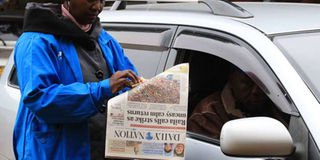You don’t have to go through hoops to get errors corrected

A newspaper vendor sells a copy of the Daily Nation in Nyeri Town on August 14, 2017. The Nation is living its commitment to accuracy and transparency. It’s being honest about journalism. PHOTO | JOSEPH KANYI | NATION MEDIA GROUP
What you need to know:
- Absence of corrections didn’t mean absence of errors. Frequent corrections now do not mean a surge of errors either.
- The NMG editorial policy requires that when errors are discovered they must be corrected promptly.
Now you don’t have to jump through hoops to get the right person so that errors in the Daily Nation can be corrected; just email [email protected].
No need to write or call the public editor — who, in any case, operates outside the newsroom — to request for a correction.
However, you can still contact the public editor if you’re not satisfied with the response you get.
The Nation has come a long way. When I came in in 2015 as the public editor, there was no such facility.
Readers encountered a culture of reluctance to own up to mistakes and publish corrections.
ACCOUNTABILITY
While journalists and editors thrived on criticising the transgressions of others, they shied away from correcting their own mistakes.
That’s why so few mistakes were corrected — so much so that some readers have been surprised, even shocked, that the Nation now frequently publishes corrections on page 2.
“Peter, what is happening…their (sic) are too many corrections and apologies from Nation almost on daily basis,” one of them wrote.
Muguna Ntumbari, on his part, wonders if Nation proofreaders have been laid off in austerity measures or they have all of a sudden become a bunch of incompetents.
On the contrary, the Nation is not making more mistakes; it’s correcting more mistakes.
Absence of corrections didn’t mean absence of errors. Frequent corrections now do not mean a surge of errors either.
ACCURACY
As corrections editor Henry Gekonde says, the Nation “has become more aggressive about setting the record straight when we make mistakes”.
He added that corrections, clarifications and apologies are a good thing: “They show that we care about accuracy in our journalism, and that we are not afraid to acknowledge errors when they occur, because we are human and we make mistakes. The best newspapers in the world do exactly what we are doing.”
The Nation is, in fact, living its commitment to accuracy and transparency. It’s being honest about journalism.
In journalism, mistakes are common. In my article, Mistakes and typos are unacceptable, but we need to see them in perspective, published on April 2, 2015, I pointed out why journalists make mistakes and why correcting them enables good journalism.
CAUSES
Journalists make mistakes because of the hurried and incomplete nature of journalism and information coming from different sources.
Due to the deadline pressure and the speed at which they work, errors can easily slip through — including those made by them because they did not do their work properly or failed to comprehend and interpret information.
In journalism, mistakes are expected. Some of the world’s leading newspapers have daily columns devoted to corrections and senior editors who deal exclusively with errors.
A newspaper without errors, it’s said, is a newspaper without journalistic guts. It takes few risks.
However, when a newspaper makes mistakes, it should correct them.
In fact, the NMG editorial policy, as well as the Code of Conduct for the Practice of Journalism in Kenya, requires that when errors are discovered they must be corrected promptly.
* * *
The Nation has done a good job reporting the Solai dam tragedy, which was not an act of God.
However, historically, the media has failed to educate the public about such things.
The tragedy might not have happened, or might have taken different dimensions, had the citizenry been aware of the duty of care imposed on all of us.
As a common law country, the law of negligence imposes a duty of care for almost anything that we do, or fail to do, that could foreseeably harm others.
Solai-type cases are notorious as liability is imposed when dangerous things on one’s land escape and cause damage, even in the absence of negligence.
The rule in Rylands v. Fletcher requires that we pay damages.
Send your complaints to [email protected]. Call or text 0721 989 264





